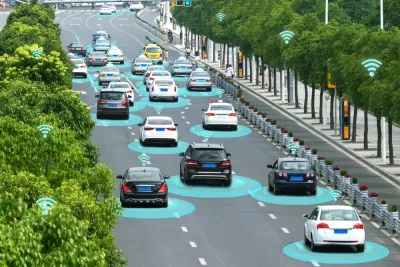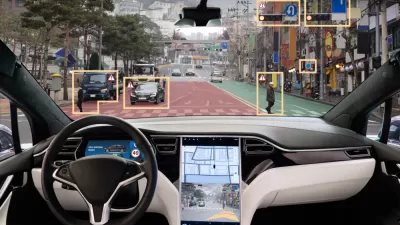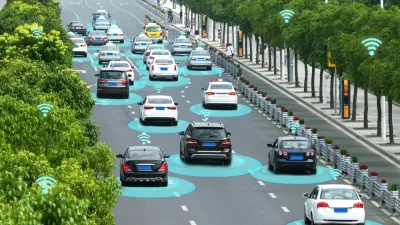A new guide says cities need to plan now for AVs so they are not caught off guard when the technology finally arrives.

Aarian Marshall writes about a recently released autonomous vehicle planning guide from the National Association of City Transportation Officials. It is the second version of the blueprint—the first was released two years ago—that presents a more cautious approach for cities to prepare for AV technology, drawing partly on the challenges that cities have more recently faced with rideshare and scooter companies.
The guide addresses issues such as road pricing for AVs and data-sharing policies with private companies. "NACTO [also] advises transportation officials to maintain control of the self-driving tests, demos, and deployments in their midst. That runs counter to the impulses of many self-driving vehicle developers, who argue that a 'patchwork' of local rules is preventing the countrywide rollout of technology that could save lives," notes Marshall.
Even though AV technology is evolving more slowly than anticipated, cities need to plan ahead, and the NACTO guide portrays a future where, with the right policies in places, AVs make cities more livable, equitable places. "Some of the largest and most influential cities in the country are clearly concerned that the autonomous vehicle experiment might go poorly for them. But they are still optimistic," says Marshall.
FULL STORY: Cities Are Trying—Again—to Plan for Autonomous Vehicles

Planetizen Federal Action Tracker
A weekly monitor of how Trump’s orders and actions are impacting planners and planning in America.

Map: Where Senate Republicans Want to Sell Your Public Lands
For public land advocates, the Senate Republicans’ proposal to sell millions of acres of public land in the West is “the biggest fight of their careers.”

Restaurant Patios Were a Pandemic Win — Why Were They so Hard to Keep?
Social distancing requirements and changes in travel patterns prompted cities to pilot new uses for street and sidewalk space. Then it got complicated.

Platform Pilsner: Vancouver Transit Agency Releases... a Beer?
TransLink will receive a portion of every sale of the four-pack.

Toronto Weighs Cheaper Transit, Parking Hikes for Major Events
Special event rates would take effect during large festivals, sports games and concerts to ‘discourage driving, manage congestion and free up space for transit.”

Berlin to Consider Car-Free Zone Larger Than Manhattan
The area bound by the 22-mile Ringbahn would still allow 12 uses of a private automobile per year per person, and several other exemptions.
Urban Design for Planners 1: Software Tools
This six-course series explores essential urban design concepts using open source software and equips planners with the tools they need to participate fully in the urban design process.
Planning for Universal Design
Learn the tools for implementing Universal Design in planning regulations.
Heyer Gruel & Associates PA
JM Goldson LLC
Custer County Colorado
City of Camden Redevelopment Agency
City of Astoria
Transportation Research & Education Center (TREC) at Portland State University
Camden Redevelopment Agency
City of Claremont
Municipality of Princeton (NJ)





























